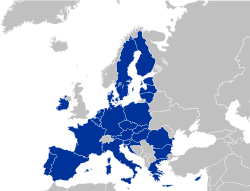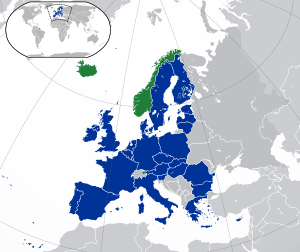Directorate-General for Competition
The Directorate-General for Competition (DG COMP) is a Directorate-General of the European Commission, located in Brussels. The DG Competition is responsible for establishing and implementing competition policy for the European Union. The DG Competition has a dual role in antitrust enforcement: an investigative role and a decision-making role.
DG Competition is also considered to be one of the most sophisticated antitrust enforcers in the world, alongside US agencies Federal Trade Commission and the Antitrust Division of the Department of Justice.[1] Its fines to corporations climbed from €3.4bn between 2000 and 2004, to €9.4bn between 2005 and 2009. Between 2010 and 2012, it totalled €5.4bn.[2]
The DG Competition policy areas include the following:
- antitrust (agreements and conduct prohibited under Articles 101 and 102 of the TFEU),
- mergers (Commission Regulation (EC) No 802/2004 implementing Council Regulation (EC) No 139/2004 (The "Implementing Regulation") and its annexes (Form CO, Short Form CO and Form RS)),
- liberalisation (Article 106 of the TFEU),
- state aid - ensuring that government interventions do not distort competition within the EU by selectively benefiting one company or a subset of companies over others (Articles 107 - 109 of the TFEU),
- international cooperation.
The DG Competition is led by commissioner Margrethe Vestager, who is currently serving a five-year term ending in 2019.[3]
See also
- European Commissioner for Competition
- European Union competition law
- European Union v. Microsoft
References
- Smyth, Patrick. "Background: What is the EC's Competition Directorate?". Irish Times. Retrieved 11 January 2018.
- The fight against the cartels: The Brussels informers (1/2), Les Echos, 9 July 2013.
- "The Commissioners: Margrethe Vestager, Competition". European Commission. Retrieved January 6, 2017.




